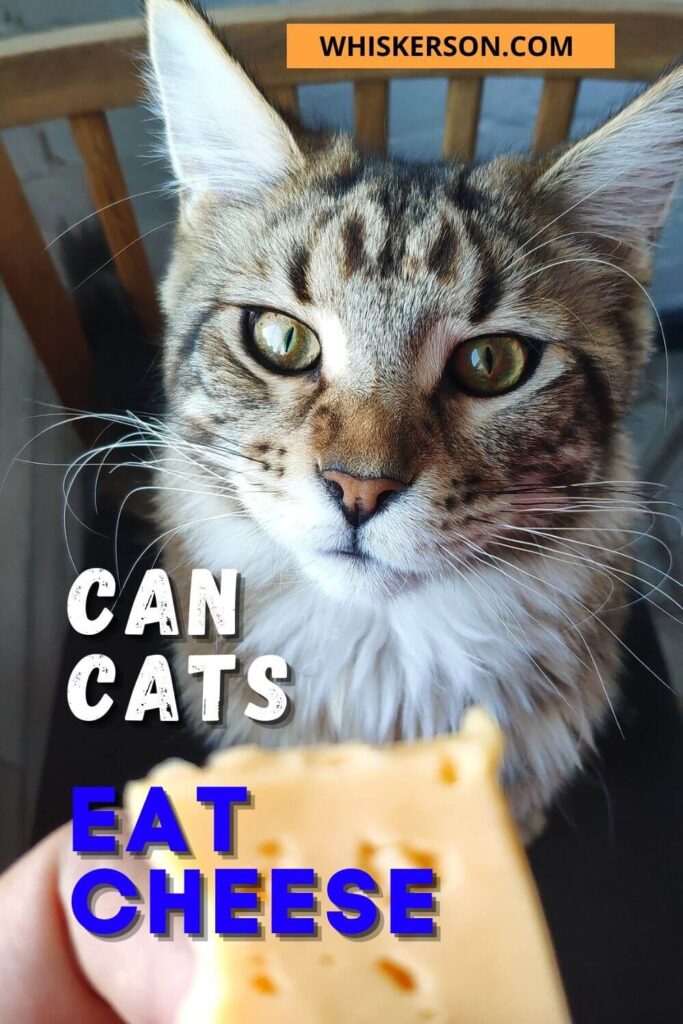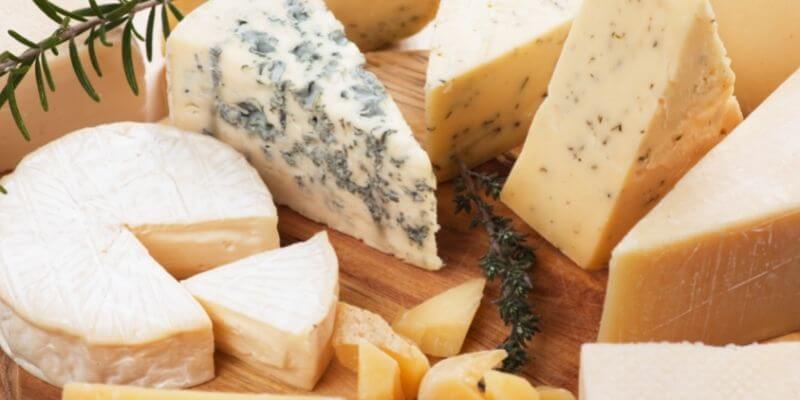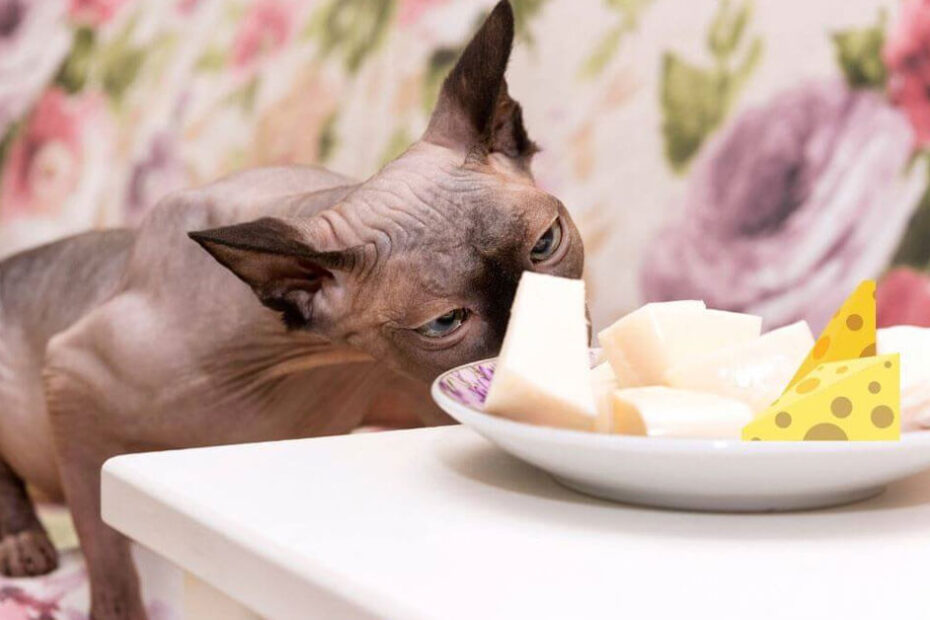Does your cat love cheese? Most cats do. They love it so much they grab it off the table before you notice it. A cat won’t say no to cheese but should they eat cheese? It’s time to find out if cats are really allowed to eat cheese.

Can cats eat cheese? The simple answer is yes, cats can eat cheese. While cats can eat cheese, the truth is their bodies are not equipped to handle it in large amounts.
Cats are carnivores and milk proteins are not easy for them to digest.
This article will answer all your questions about cats and cheese. We discuss the most common cheeses and how they affect your cat’s digestive system.
Let’s get into it!
Cats, Kittens, and Dairy
But wait? Don’t kittens drink their mother’s milk? Yes, kittens do drink their mother’s milk. The key here is that kittens grow out of that. Some adult cats will still drink dairy, but many do not.
Something to keep in mind is that a mother cat’s milk has what kittens need. Cow’s milk, on the other hand, has none of these nutrients. This is why we have to make a special kitten formula for kittens that have lost their mother.
But what about those cats that do like milk and cheese? This is where things get a little complicated. The truth is some cats can tolerate milk and some cats love cheese. In these cases, the question becomes not “can they eat cheese” but “should I give my cat cheese”.
Cats with Dairy Allergies or Dairy Intolerances
While numbers are not concrete, most vets agree a vast majority of cats are lactose intolerant. A small percentage of cats are allergic to dairy.
Dairy allergies can exhibit vomiting or masquerade as other problems. The more violent your cat’s reaction to milk, cheese, or other dairy products the more likely it is an allergy instead of intolerance.
Dairy intolerance exhibits itself usually with diarrhea within 8-12 hours or as gas and bloating. While dairy intolerances are typically milder than dairy allergies, an important thing to remember is that cats can obtain allergies at any stage of their lives, and intolerance may become an allergy.
Other Symptoms of Dairy Intolerances or Allergies:
- Itchy skin
- Rashes
- Hair loss
- Weight loss
- Lack of appetite
- Digestive pain
- Digestive disorders: such as Inflammatory Bowel Disease and Inflamed sections of digestive tract.
But My Cat Is Not Allergic to Dairy
This may be true. Your cat may not exhibit any of these symptoms when drinking milk or eating cheese. However, just like humans, cats can develop an intolerance or allergy at any point in their life.
You may be wondering: if my cat isn’t allergic and doesn’t have an intolerance, can I feed them cheese? Again, the simple answer is yes, but consider the following points.
- What happens if your cat develops an intolerance or allergy?
- What if your cat develops health problems?
- Are you ready to deny them this treat?
- Can you face that adorable, pleading kitty face and stay strong?
If you feed your cat cheese now and later they develop an allergy or intolerance, you will have to deny them cheese. If you use cheese as a treat and suddenly they can’t have it, you will have to cut it out completely.
The only way to deal with an allergy or intolerance is to remove the “bad” food from your cat’s diet. If you have more than one cat, then that also means removing it from the diet of your other cat(s).
If you only deny one cat and not the others, they will notice. Cats are smart. Most likely your kitty will find a way to get ahold of another kitty’s cheese or milk.

Cheese and Cat Health
Perhaps you have been feeding your cat cheese since they were a kitten. And maybe they are already used to it. So, do you have to stop now, even though they aren’t exhibiting any of the allergy or intolerance symptoms?
No, you do not have to stop now. If your cat is healthy and shows no sign of a dairy allergy or intolerance you can keep feeding them cheese. If you decide to do this, it is important that you have all the facts regarding cheese and cat health.
Cheese is High in Protein
Cheese is high in protein and, while the protein in cheese is different from that of animal meats, it can still provide some nutrition to your cat. If your cat is able to digest it properly then there is no harm in giving your cat a little cheese every now and then.
Cheese is High in Fat
Cheese is often high in fat. This is a big one. If your cat is eating cheese and gaining weight, you may need to limit its cheese intake or remove it. In addition, high-fat foods can upset kitty stomachs even when they do not have an intolerance or allergy to the food.
Cheese is High in Salt
Many cats struggle with staying hydrated. This causes liver failure later in life. Cheese is salty and salt dehydrates cats in large amounts. If your cat is eating cheese and dry hard cat food, their salt intake may be too high.
Toxic Cheese Ingredients
Cheeses may contain toxic ingredients to cats. Examples are flavored cheeses such as onion, garlic, and chives. If you decide to feed your cat cheese, stick to plain unflavored cheeses and fresh, less salty cheeses.
Cats and Non-Dairy Cheeses
What about non-dairy cheeses? Can you feed your cat these cheeses?
While removing dairy from the equation might seem like the perfect solution, you need to consider what is replacing that dairy.
First and foremost, removing dairy does not necessarily make the cheese less fatty. Indeed, some non-dairy cheeses can be just as fatty or fattier.
Nut Cheeses

While some nuts are safe for cats to eat, others are not. Macadamia nuts and walnuts can cause severe health problems in cats.
The mildest form of nut allergy or intolerance is itchy, dry skin and/or rashes. Other symptoms can include chewing on runny or itchy eyes, vomiting, coughing or sneezing, hair loss, hot spots, and diarrhea.
Even when a nut is not one of the more dangerous nuts, it can still be unhealthy for cats. Almonds, for instance, are not poisonous to cats but the fat content can be upsetting for a cat’s stomach.
Other health problems come with eating nuts, including an increased risk of pancreatitis and diabetes. Weight gain is another common health problem that can lead to other health problems such as heart disease.
So, which nuts are toxic and which are not?
Nuts that are High in Fat and Non-Toxic to Cats
Cheeses made out of Almonds, Brazil Nuts, Cashews, and Pecans may be safe to feed to your cat(s). The fat content, as well as the saltiness of these cheeses, can be upsetting to cat stomachs.
Hazelnuts are non-toxic but high in fat. Their size and shape also make them a choking hazard.
While no studies on pine nuts and cats have been done, it is safe to say that a nut, as high in fat as pine nuts are, would not be good for your kitty.
Nuts that are Non-Toxic
Chestnuts are non-toxic but high in carbohydrates. They are lower in fat than most nuts. They contain magnesium and potassium which can be beneficial in small amounts.
Coconut is non-toxic to cats. As a dietary supplement, it is healthy in small amounts. Coconut can be high in fat so avoid giving your cat too much.
Nuts that are NOT HEALTHY for Cats
The following nuts are not healthy for cats and should be avoided: Macadamia Nuts, Peanuts, Pistachios, and Walnuts.
Macadamia Nuts are potentially toxic to cats. The evidence is circumstantial because cat responses to toxic foods (such as vomiting) also happen if a cat is allergic or intolerant to a food. These nuts are also high in fat.
Peanuts are non-toxic to cats. However, some foods made with them may have other toxic ingredients in them. Peanuts are also high in fat and often come with lots of salt or flavoring.
While pistachios themselves are not toxic to cats they are usually sold heavily salted and flavored which makes them a big no-no.
While there is no direct evidence of cats being made sick by walnuts because of toxicity, they are high in fat.
Can you feed your cat nut cheeses?
Be careful to read the ingredients before you do. A lot of these cheeses will use artificial flavorings which can be harmful to cats. It is best to avoid nut cheeses as a substitute.
Soy Cheeses

Cats can eat soy cheese. However, be careful to look at the ingredients listed as some of them may be bad for your cat.
In addition, soy and other vegetables do not provide many of the nutrients a cat needs. Cats get most of their nutrients from animal proteins. Therefore, soy cheese can replace dairy cheese, again in small amounts, but it cannot be more than an occasional treat.
Final Throught
So, Can I Feed My Cat Cheese?
Yes, you can. However, it is not recommended. If your cat is not already eating cheese don’t start feeding it to them. If your cat is already eating cheese, it is up to you to decide. Will you keep feeding them cheese? Or will you change to a different snack? You might want to look into the alternative cheeses mentioned in this article.
